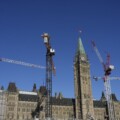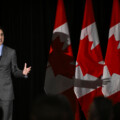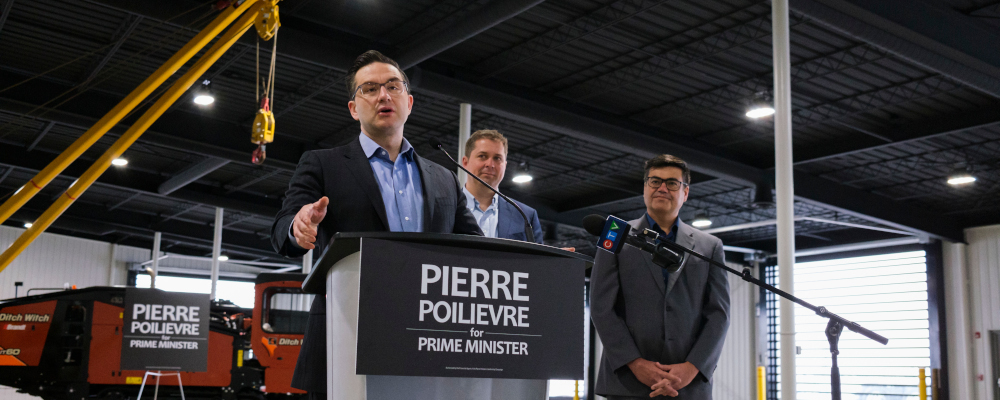A sign of an astute politician is the ability to discern the big challenges facing his or her society and then to develop a compelling policy narrative and coherent governing agenda that responds to them. Think of Franklin Delano Roosevelt’s New Deal“New Deal, domestic program of the administration of U.S. Pres. Franklin D. Roosevelt (FDR) between 1933 and 1939, which took action to bring about immediate economic relief as well as reforms in industry, agriculture, finance, waterpower, labour, and housing, vastly increasing the scope of the federal government’s activities.” https://www.britannica.com/event/New-Deal as a left-wing example or Mike Harris’ Common Sense Revolution“While inspired by the “Red Book”, the Common Sense Revolution was a decidedly right wing and populist document, promising broad tax cuts (30 percent) and less government. Not only a successful campaign document, the Common Sense Revolution became a governing template for eight years – and two majority mandates – of Harris government.” https://parli.ca/common-sense-revolution/ as a right-wing one.
Conservative party leadership candidate Pierre Poilievre has made the idea of “gatekeepers” a key part of his early campaign message. It has the potential to similarly connect an overarching political narrative and accompanying policies to what may be the most pressing economic issue facing Canada: supply-driven stagflation caused in some part by sclerotic regulatory institutions and processes.
The basic notion of the gatekeepers is that a combination of bureaucratic inertia and intransigence has come to stand in the way of new housing construction, public transit and other community infrastructure, and natural resource projects obtaining regulatory approval and getting built.
According to this political economy diagnosis, we’ve effectively created a policy environment in which the physical economy—what Peter Thiel refers to as the “world of atoms” as opposed to the “world of bytes”—is mired by red tape, endless consultations, and multiple and overlapping project approvals.
One of the strengths of this message is it’s substantively correct. There’s considerable evidence, for instance, that Canada underperforms its peers on construction timelines and costs, drug approval timelines, and policy-induced housing costs.
Just consider that Canada presently ranks 34th of 35 OECD countries for the length of time to obtain general construction permits.“It takes nearly 250 days to get a permit in Canada – three times (168 days) longer than our competitors in the United States. In the OECD, only the Slovak Republic takes longer.” https://theorca.ca/visiting-pod/slow-permit-processes-undermine-canadas-competitiveness/ This has contributed to, among other things, the dubious distinction of being home to the fewest homes per capita of any G7 country and a national average house price of $816,720 and counting.
Due in large part to the tangibility of these outcomes, Poilievre’s critique of the gatekeepers has the potential to be a politically potent message. As Ben Woodfinden recently wrote for The Hub, it appeals to a significant mix of core conservative voters, populists, younger Canadians, and those who increasingly feel “left behind.” This constellation of voters could form the basis of a broad-based coalition capable of competing for national power.
Poilievre’s message has tended to focus on housing, which is intuitive both because of the magnitude of the supply-driven price increases (20 percent year-over-year) and the issue’s political salience. But there’s scope to extend his narrative more broadly to describe how government policy —from drug approvals to occupational licensing—is contributing to artificial scarcity across the entire economy.
This point is worth underscoring: Poilievre is not only on the right track but, if anything, he may be underestimating the relevance, scope, and appeal of his gatekeeper narrative. He can draw on a growing intellectual and political movement calling for a new supply-side agenda—what The Atlantic’s Derek Thompson has defined as an “abundance agenda”—as a much-needed response to today’s twin economic challenges of rising inflation and slow growth.
These “new industrialists”, as Bloomberg columnist Noah Smith has called them, come from different political persuasions and intellectual backgrounds but they share one common idea: we need to unshackle the modern economy so we can build and produce more stuff.
Their basic insight is that the progressive focus on demand-side policies—namely, redistributionist changes to the tax and transfer system—may advance certain equity goals but they’re no substitute for a pro-growth policy agenda.“Canada’s economic sluggishness long predates the COVID-19 crisis. The rate of economic growth has been falling decade-over-decade for the past fifty years. Average annual GDP growth per decade between 1960 and 2000 was 4.08 percent. It has been just 1.99 percent since the start of this century.” https://on360.ca/policy-papers/a-post-pandemic-growth-strategy-for-canada/ As a matter of economics, redistribution without growth is a recipe for stagflation. And, as a matter of politics, it’s a recipe for populism, polarization, and a diminished sense of progress.
The unofficial manifesto of the “Building More Stuff” movement may be a 2020 essay by leading American venture capitalist Marc Andreessen entitled “It’s Time to Build”. It set out a comprehensive critique of the failings of Western economies to build and produce in the physical economy. In response, Andreessen called for a new Left-Right political consensus in favour of “building.”
Since then, such a consensus has started to take shape. Leading thinkers including New York Times columnist Ezra Klein, George Mason University economist Tyler Cowen, and even Treasury Secretary Janet Yellen have endorsed a new supply-side agenda focused on boosting production in key sectors such as advanced manufacturing, clean energy technologies, agriculture and agri-food, and biomedicine.
The policy expression of the “abundance agenda” is the subject of some debate. Depending on one’s ideological preferences, it may involve a bigger or smaller role for the state in terms of public-private partnerships, public investment, and private investment incentives. But virtually all of its proponents agree that it requires sweeping regulatory reforms. As Klein recently wrote (citing an interview with an environmental scholar): “it [regulatory policy] penalizes and regulates technology, infrastructure and growth—often quite explicitly.”
One of the key strengths of this line of thinking is that it stands in contrast to the zero-sum politics that have marked the post-financial crisis era. It is inherently positive-sum, futuristic, and pro-progress. Thompson calls it “unabashedly utopian”, Smith has described it as the “product of hope”, and Klein has positioned it as a means to a “radically better” future. It’s a powerful idea that has only taken on greater salience in light of current supply bottlenecks.
Notwithstanding its growing prominence in U.S. intellectual and political circles, there hasn’t quite yet been a similar pro-Building More Stuff movement in Canada. There are exceptions of course—Hub contributors Chris Spoke and Matt Spoke are examples and a recent Ontario Housing Affordability Task Force has a pro-building bias—but it’s fair to say that Poilievre has something of a first-mover advantage on a message of abundance and progress.
The good news for him is that there’s certainly a lot of evidence for a new supply-side agenda to draw on. Take the federal Department of Health’s drug approval process. Last month the National Post reported that the global pharmaceutical company Merck has thousands of doses of its COVID-19 therapeutic drug in storage while it awaits federal approval.
Never mind the drug has been approved by regulators in peer jurisdictions such as the United States and the United Kingdom. Or that the World Health Organization has recommended its use for high-risk patients. Or that the federal Industry Minister, François-Philippe Champagne, previously lauded Merck’s partnership with a Whitby-based company to manufacture the drug here in Canada.
Notwithstanding these key considerations, the federal government has still carried out its regulatory review at what’s been described as a “snail-like speed.” The costs of these drug approval delays, unlike in the case of housing, won’t be mainly measured in higher prices but rather in higher rates of hospitalization and even deaths from COVID-19.
In this particular case, the answer probably ought to have come in some form of regulatory harmonization with the United States such as a system of mutual recognition, joint review panels, or what is sometimes known as a “convergence test.” At this point, though, it’s critical that the Department of Health just approve the drug so that it can be administered in Canada as soon as possible.
More generally, Canadian policymakers should be replacing these slow and duplicative regulatory processes—particularly in the face of a life-threatening endemic—with a model that preferences progress over a lot of bureaucratic busywork. Think of it as a pro-abundance response to the problem of government-induced scarcity.
There are countless other examples across the Canadian economy that similarly represent an impediment to growth and progress. Poilievre is right therefore to focus on the gatekeepers. They stand in the way of abundance. It’s time to open the gates.
Recommended for You

The Notebook by Theo Argitis: Carney’s One Big Beautiful Tax Cut, and fresh budget lessons from the U.K.

Rudyard Griffiths and Sean Speer: The fiscal hangover from the One Big Beautiful Bill hits Canada

Lucy Hargreaves: Canada needs builders, not bystanders

Ginny Roth: How vacant liberal nationalism left Canada worse off than George Grant even imagined




